1
And he knew, also, what the old man was thinking as his tears flowed, and he, Rieux, thought it too: that a loveless world is a dead world, and always there comes an hour when one is weary of prisons, of one's work, and of devotion to duty, and all one craves for is a loved face, the warmth and wonder of a loving heart.Albert Camus
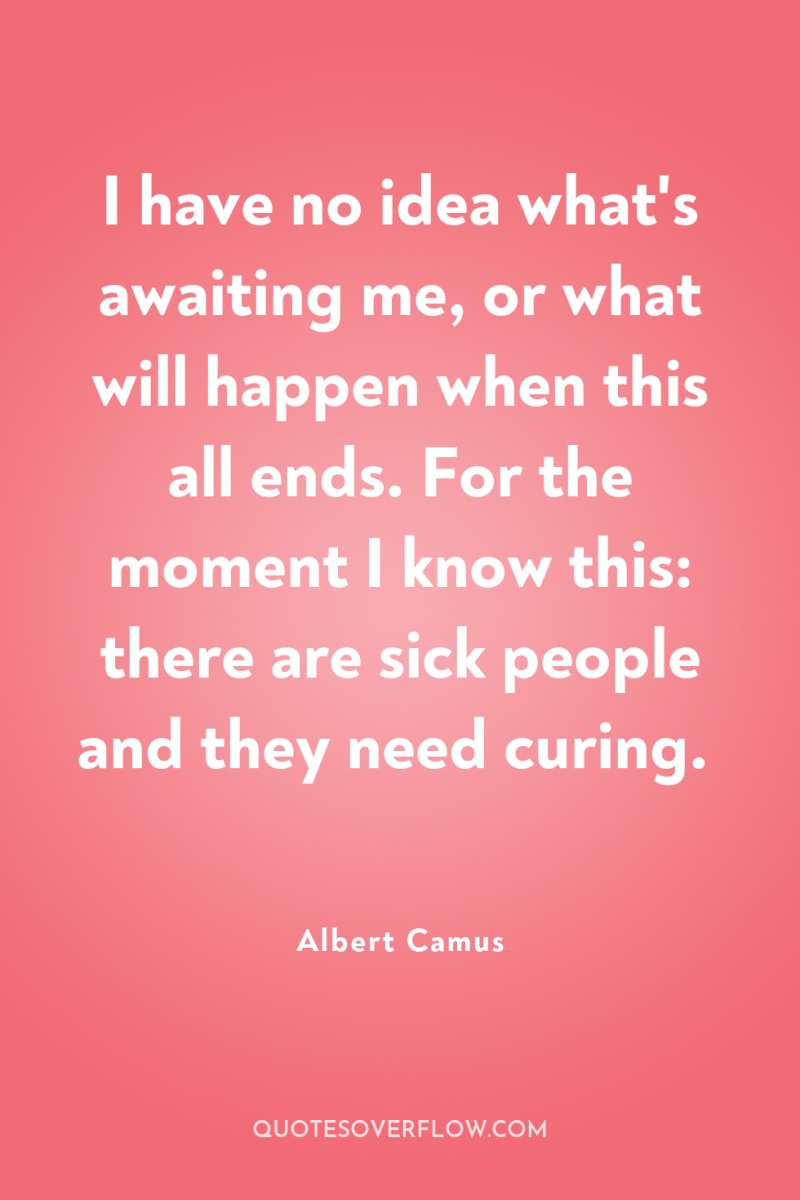
2
I have no idea what's awaiting me, or what will happen when this all ends. For the moment I know this: there are sick people and they need curing.Albert Camus
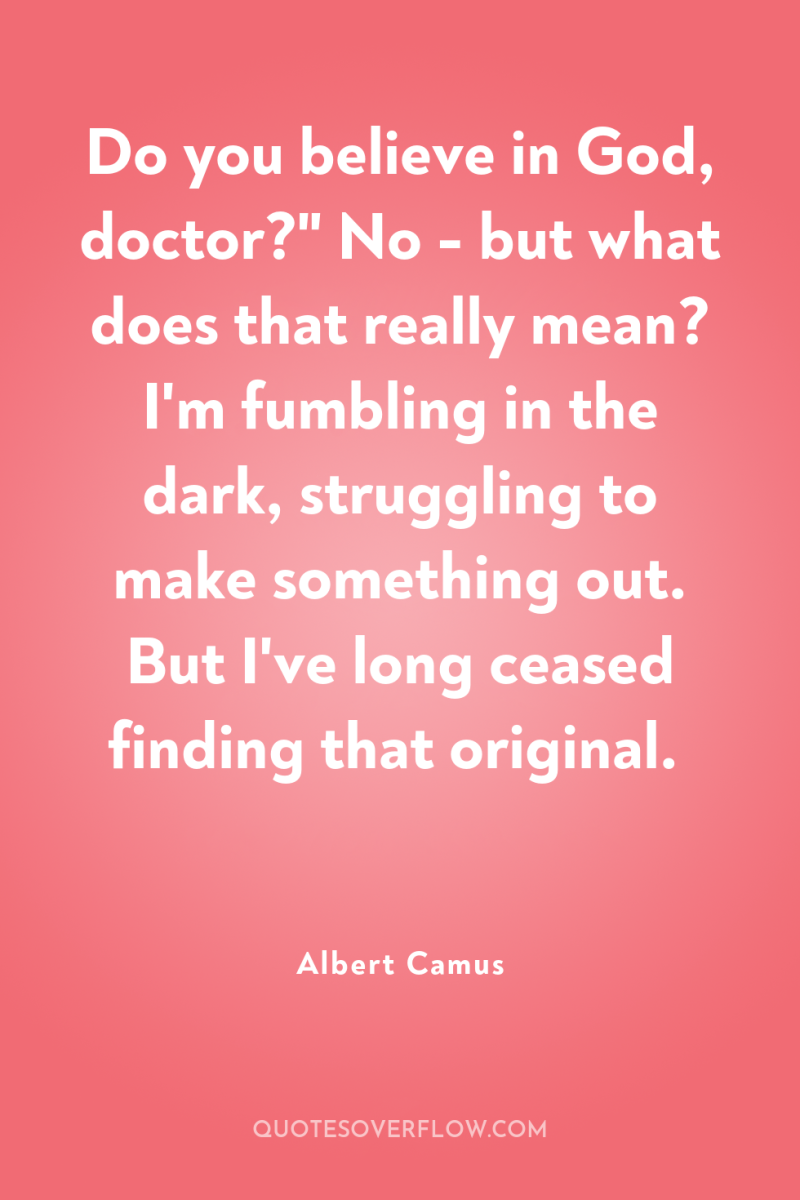
3
Do you believe in God, doctor?" No - but what does that really mean? I'm fumbling in the dark, struggling to make something out. But I've long ceased finding that original.Albert Camus
4
In vain a zealous evangelist with a fely hat and flowing tie threads his way through the crowd, crying without cease: 'God is great and good. Come unto Him.' On the contrary, they all make haste toward some trivial objective that seems of more immediate interest than God.Albert Camus
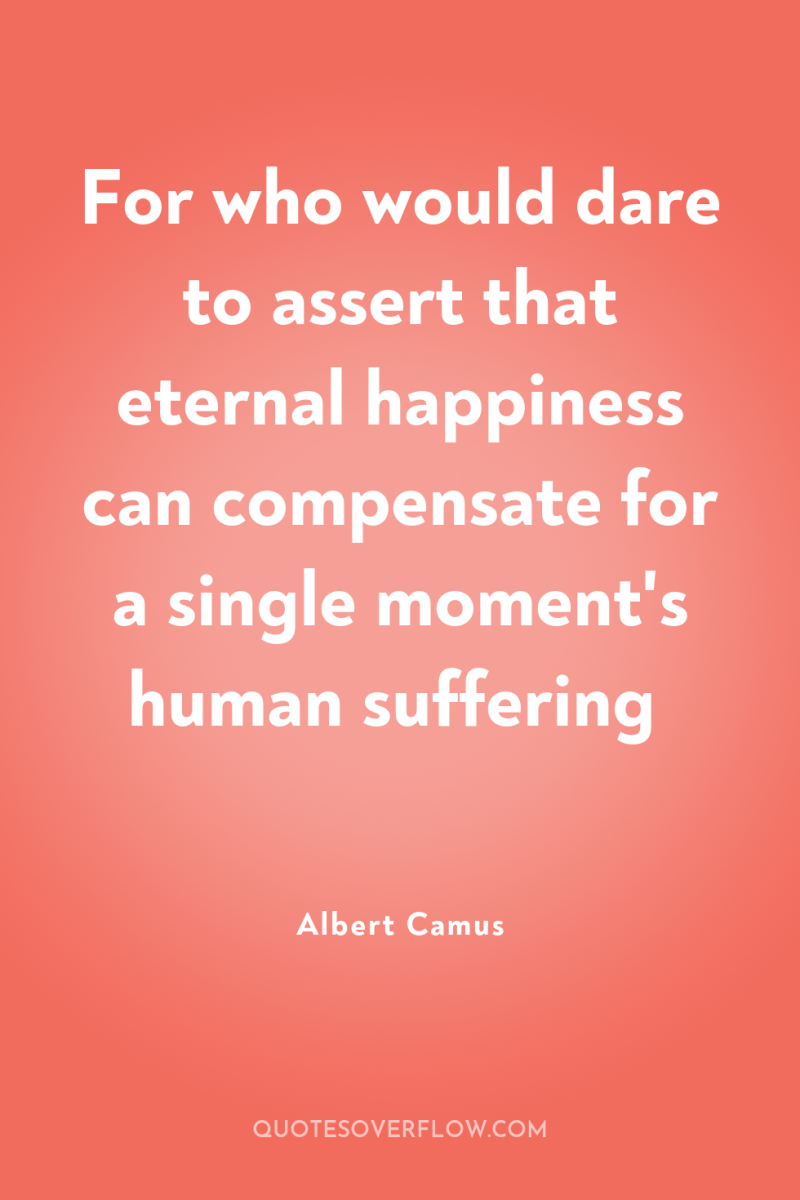
5
For who would dare to assert that eternal happiness can compensate for a single moment's human sufferingAlbert Camus
6
At such moments the collapse of their courage, willpower, and endurance was so abrupt that they felt they could never drag themselves out of the pit of despond into which they had fallen. Therefore they forced themselves never to think about the problematic day of escape, to cease looking to the future, and always to keep, so to speak, their eyes fixed on the ground at their feet. But, naturally enough, this prudence, this habit of feinting with their predicament and refusing to put up a fight, was ill rewarded. For, while averting that revulsion which they found so unbearable, they also deprived themselves of those redeeming moments, frequent enough when all is told, when by conjuring up pictures of a reunion to be, they could forget about the plague. Thus, in a middle course between these heights and depths, they drifted through life rather than lived, the prey of aimless days and sterile memories, like wandering shadows that could have acquired substance only by consenting to root themselves in the solid earth of their distress.Albert Camus
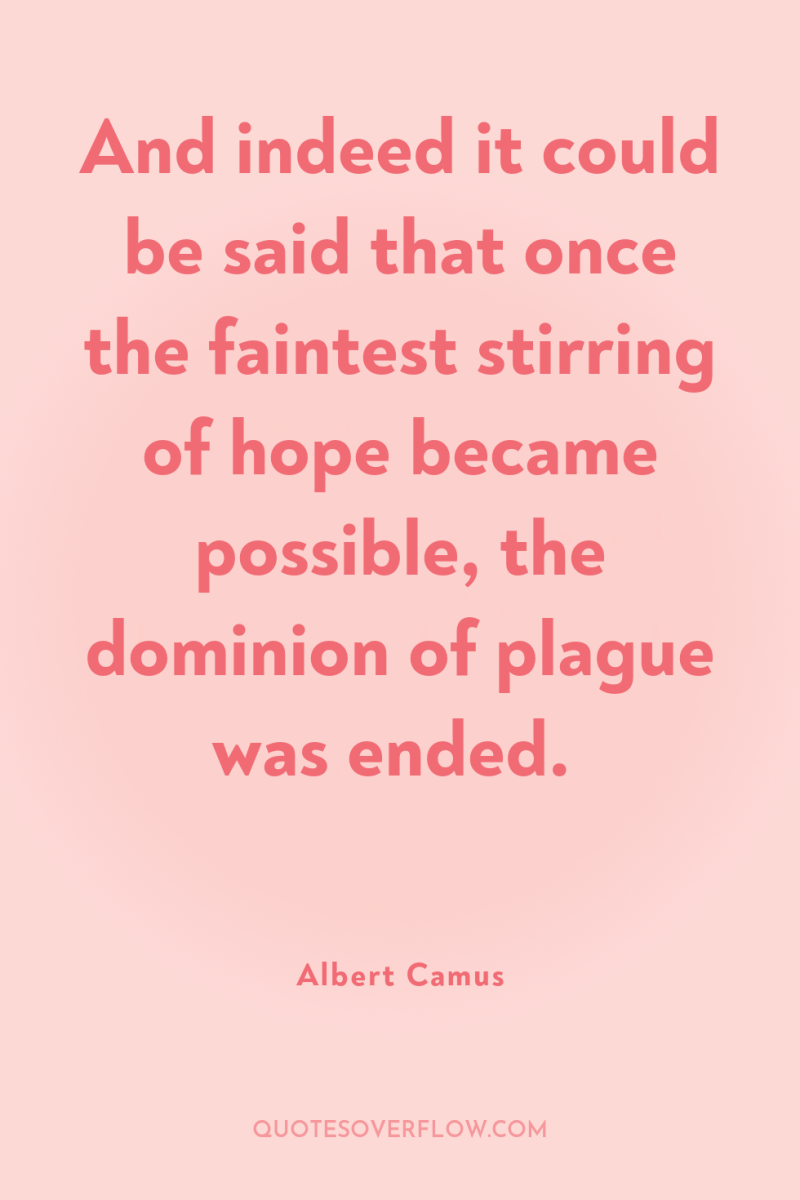
7
And indeed it could be said that once the faintest stirring of hope became possible, the dominion of plague was ended.Albert Camus
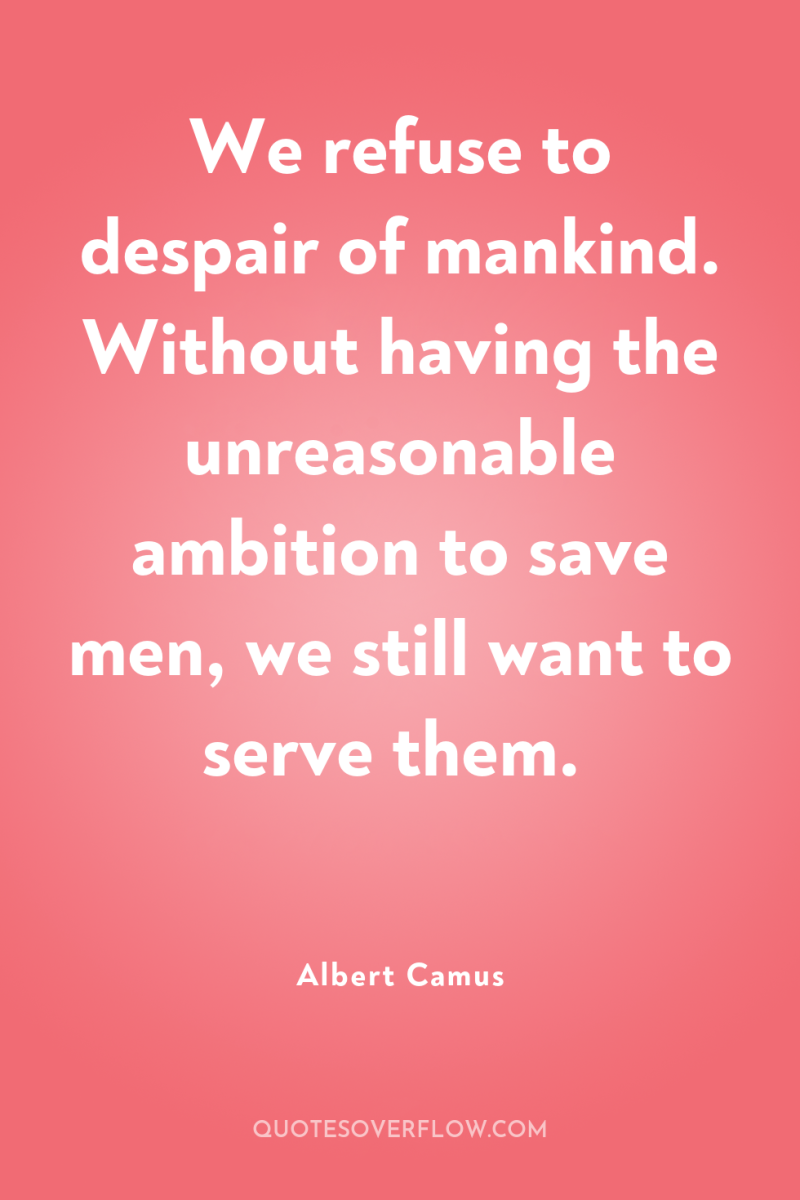
8
We refuse to despair of mankind. Without having the unreasonable ambition to save men, we still want to serve them.Albert Camus
9
I have realized that we all have plague, and I have lost my peace. And today I am still trying to find it; still trying to understand all those others and not to be the enemy of anyone. I only know that one must do what one can to cease being plague-stricken, and that's the only way in which we can hope for some peace or, failing that, a decent death. This, and only this, can bring relief to men and, if not save them, at least do them the least harm possible and even, sometimes, a little good. .Albert Camus
10
In a certain sense it might well be said that his was an exemplary life. He was one of those rare people, rare in our town as elsewhere, who have the courage of their good feelings. What little he told of his personal life vouched for acts of kindness and a capacity for affection that no one in our times dares own to. Without a blush he confessed to dearly loving his nephews and sister, his only surviving near relation, whom he went to France to visit every other year. He admitted that the thought of his parents, whom he lost when he was very young, often gave him a pang. He did not conceal the fact that he had a special affection for a church bell in his part of the town which started pealing very melodiously at about five every afternoon.Albert Camus
11
He was one of those rare people, rare in our town as elsewhere, who have the courage of their good feelings. What little he told of his personal life vouched for acts of kindness and a capacity for affection that no one in our times dares own to.Albert Camus
12
But memory is less disposed to compromiseAlbert Camus
13
Tarrou had "lost the match, " as he put it. But what had he, Rieux, won? No more than the experience of having known plague and remembering it, of having known friendship and remembering it, of knowing affection and being destined one day to remember it. So all a man could win in the conflict between plague and life was knowledge and memories. But Tarrou, perhaps, would have called that winning the match. .Albert Camus
14
The evil that is in this world always comes of ignorance, and good intentions may do as much harm as malevolence, if they lack understanding. On the whole, men are more good than bad; that however isn't the real point. But they are more or less ignorant, and it is this that we call vice or virtue;Albert Camus
15
The evil that is in the world comes out of ignorance, and good intentions may do as much harm as malevolence, if they lack understanding. One the whole, men are more good than bad; that, however, isn't the real point. But they are more or less ignorant, and it is this that we call vice or virtue; the most incorrigible vice being that of an ignorance that fancies it knows everything and therefore claims for itself the right to kill.Albert Camus
16
At the beginning of a pestilence and when it ends, there's always a propensity for rhetoric. In the first case, habits have not yet been lost; in the second, they're returning. It is in the thick of a calamity that one gets hardened to the truth - in other words, to silence.Albert Camus
17
It is in the thick of a calamity that one gets hardened to the truth, in other words to silence.Albert Camus
18
I know positively - yes Rieux I can say I know the world inside out as no one on earth is free from it. And I know too that we must keep endless watch on ourselves lest in careless moment we breathe in somebody's face and fasten the infection on him. What's natural is the microbe. All the rest- health integrity purity if you like - is a product of the human will of vigilance that must never falter. The good man the man who infects hardly anyone is the man who has the fewest lapses of attention. And it needs tremendous will-power a never ending tension of the mind to avoid such lapses. Yes Rieux it's a wearying business being plague-stricken. But it's still more wearying to refuse to be it. That's why everybody in the world today looks so tired everyone is more or less sick of plague. But that is also why some of us who want to get the plague out of their systems feel such desperate weariness a weariness from which nothing remains to set us free except death. .Albert Camus
19
One of the cafés had that brilliant idea of putting up a slogan: 'the best protection against infection is a good bottle of wine', which confirmed an already prevalent opinion that alcohol is a safeguard against infectious disease. Every night, towards 2 a.m., quite a number of drunk men, ejected from the cafés , staggered down the streets, vociferating optimism.Albert Camus
20
Why, because an author has more rights than ordinary people, as everybody knows. People will stand much more from him.Albert Camus
21
They fancied themselves free, and no one will ever be free so long as there are pestilences.Albert Camus
22
On the whole men are more good than bad; that, however, isn't the real point. But they are more or less ignorant, and it is this that we call vice or virtue; the most incorrigible vice being that of an ignorance which fancies it knows everything and therefore claims for itself the right to kill. The soul of the murderer is blind; and there can be no true goodness nor true love without the utmost clear-sightedness.Albert Camus
23
On moonlight nights the long, straight street and dirty white walls, nowhere darkened by the shadow of a tree, their peace untroubled by footsteps or a dog's bark, glimmered in the pale recession. The silent city was no more than an assemblage of huge, inert cubes, between which only the mute effigies of great men, carapaced in bronze, with their blank stone or metal faces, conjured up a sorry semblance of what the man had been. In lifeless squares and avenues these tawdry idols lorded it under the lowering sky; stolid monsters that might have personified the rule of immobility imposed on us, or, anyhow, its final aspect, that of a defunct city in which plague, stone, and darkness had effectively silenced every voice.Albert Camus
24
I know that man is capable of great deeds. But if he isn't capable of great emotion, well, he leaves me cold.Albert Camus
25
But, you know, I feel more fellowship with the defeated than with saints. Heroism and sanctity don't really appeal to me, I imagine. What interests me is being a man.Albert Camus
26
The truth is that everyone is bored, and devotes himself to cultivating habits.Albert Camus
27
There lay certitude; there, in the daily round. All the rest hung on mere threads and trivial contingencies; you couldn't waste your time on it. The thing was to do your job as it should be done.Albert Camus